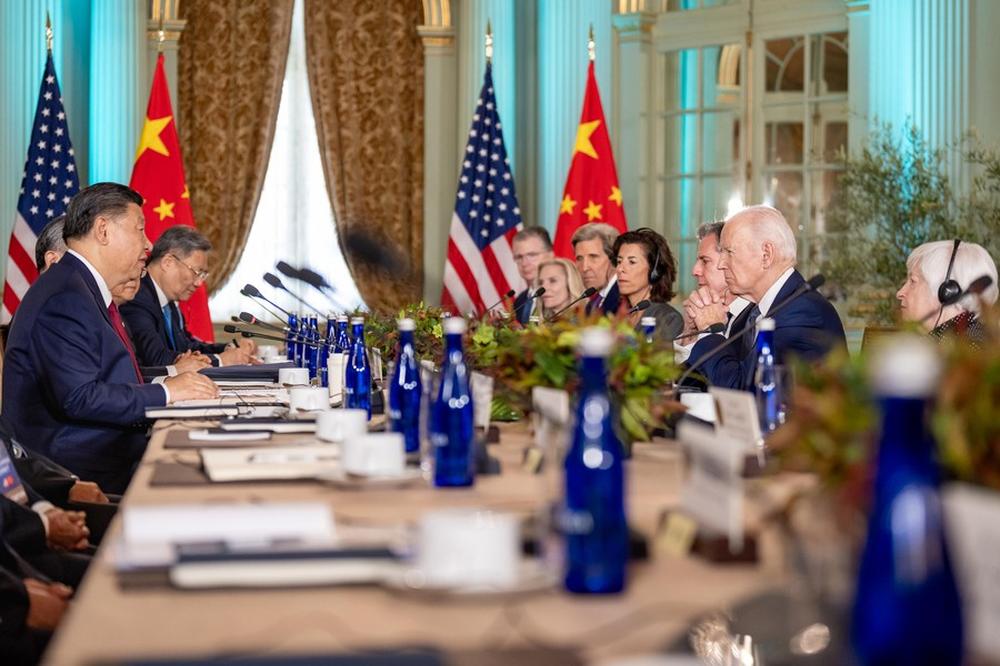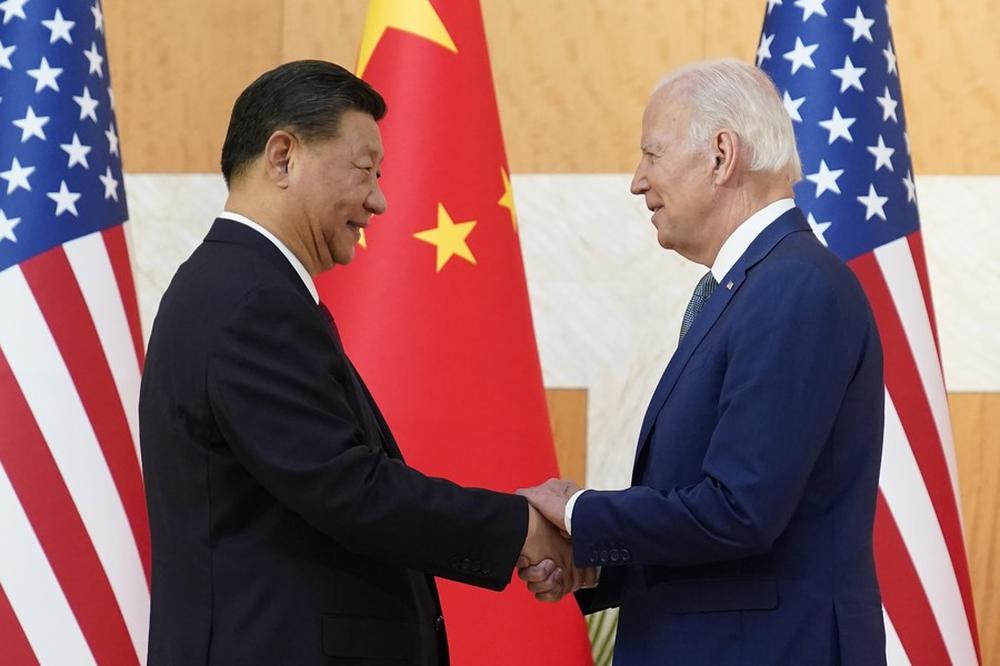- #China
- #Economy & Trade
- #Japan
- #US Foreign Policy

► The United States and key allies, including Germany, France, Australia, and Japan, have engaged in high-level dialogues with China to expand economic cooperation, with significant diplomatic visits.
► The recent U.S.-China dialogue, highlighted by the Biden-Xi summit, is driven by short-term policy considerations, with no fundamental shift in U.S. policy.
► The U.S. efforts to restore high-level communications with China are perceived as a tactical response addressing domestic political agendas and economic interests, rather than indicating a fundamental shift in policy.
► While Beijing cautiously responds with hopes for easing sanctions, it also aims to expand economic cooperation with major EU countries to bolster their "strategic autonomy" from the U.S. and reduce diplomatic efforts to unite these countries against China.
While recent Korea’s relationship with China has been stalled, a notable shift in the U.S. and its key allies and partners’ approach towards China has been found since the end of 2022. Washington has shifted to a simultaneous pursuit of dialogue and pressure in dealing with China, and countries allied with and partnering with the U.S. are seeking dialogue with Beijing and expanding the scope of cooperation, especially in the economic domain.
1. The recent U.S. and Major U.S. Allies and Partners' Dialogues with China
The United States, along with major allies and partners such as Germany, France, Australia, and Japan, has been engaging in high-level dialogues with China and seeking ways to expand economic cooperation with Beijing. In November 2022, German Chancellor Olaf Scholz visited China with a team of top corporate executives. In June 2023, Premier Li Qiang chose Germany as his first destination abroad since taking office and met with Chancellor Scholz to hold the 7th China-German intergovernmental consultations. On March 30 and 31, Spanish Prime Minister Pedro Sánchez visited China to mark the 50th anniversary of the establishment of diplomatic relations between Spain and China. In April 2023, French President Emmanuel Macron visited China for a summit meeting with President Xi Jinping in Paris and discussed economic cooperation. In June 2023, Premier Li Qiang visited France to attend the “New Global Financing Agreement Summit” and held talks with President Macron.
Furthermore, the relationship between China and Australia, which has been in a downward spiral for years, started showing signs of thaw. In December 2022, Australian Minister for Foreign Affairs Penny Wong visited China to attend events marking the 50th anniversary of the establishment of diplomatic relations between Australia and China. Australian Trade Minister Don Farrell also headed to China in May 2023. In November 2022, Prime Minister Anthony Albanese became the first Australian prime minister to have met with President Xi Jinping in six years with his summit meeting with Xi on the sidelines of the G20 summit in Bali. Then, Prime Minister Albanese officially visited China and met President Xi on November 6, 2023, to confirm the bilateral cooperation including the economic sector.
Japan has seen changes in its relationship with China. In April 2023, Japanese Foreign Minister Hayashi Yoshimasa visited China and held talks with Chinese Foreign Minister Qin Gang. It has been reported that the Japanese and Chinese governments are coordinating efforts to hold a summit meeting between Prime Minister Fumio Kishida and President Xi Jinping. Although the release of treated wastewater from the Fukushima site in August 2023 has strained bilateral relations and helped fuel anti-Japanese sentiment in China, Meets with Japanese Prime Minister Fumio Kishida met President Xi Jinping on November 16, 2023, while he visited San Francisco, U.S. to participate in the 30th APEC Economic Leaders' Meeting.
The Biden administration has made efforts to reboot dialogue with China while acknowledging, to some extent, the fact that its key allies and partner countries are working to re-engage and expand economic cooperation with China. In early 2023, high-level talks between the U.S. and China, which came to a halt in the wake of Chinese spy balloon operations and allegations of Chinese aid to Russia’s war efforts in Ukraine, have been resumed. On May 10-11, 2023, Jake Sullivan, the National Security Advisor to the President of the United States, held talks with Wang Yi in Vienna, Austria. And a day after the G7 summit in Japan, President Biden said in a press conference that he expected a “thaw” in relations with China.
After President Biden predicted a coming “thaw,” the U.S. government has stepped up efforts to rebuild relations by high-level interactions between U.S. and Chinese officials. On May 25, U.S. Secretary of Commerce Gina Raimondo and Minister of Commerce of China Wang Wentao met for talks in Washington. From June 18-19, Secretary of State Antony J. Blinken traveled to Beijing for meetings with President Xi Jinping, Director of the CCP Central Foreign Affairs Office Wang Yi, and State Councilor and Foreign Minister Qin Gang.
U.S. Treasury Secretary Janet Yellen, who has emphasized the importance of economic cooperation with China met with then-Chinese Vice Premier Liu He in Zurich, Switzerland in January. Between July 6th and 9th, Secretary Yellen traveled to Beijing and met with Chinese Premier Li Qiang and Vice Premier He Lifeng. In addition, U.S. Climate Envoy John Kerry visited China from July 16 to 19 to hold discussions with Xie Zhenhua, the Special Representative for Climate Change Affairs of China, and met with Wang Yi on July 18. And on August 28, Secretary Gina Raimondo flew to China for a substantive discussion with Minister Wang Wentao on a range of economic issues including export control measures. Senate Majority Leader Chuck Schumer (D-NY) led a bipartisan Senate delegation and met with President Xi on October 9, 2023. And finally, President Biden met President Xi on November 15, 2023, during the 30th APEC Economic Leaders' Meeting in San Francisco, U.S., after the Chinese Foreign Minister Wang Yi and Vice Premier He Lifeng visited the U.S. in October and November 2023 respectively.
In addition, major American companies doing business in China, endeavoring to protect their interests and maintain a foothold in the Chinese market. For instance, Tim Cook, the CEO of Apple, visited China in March 2023, held meetings with Premier Li Qiang, and organized events with Chinese consumers. And in May, Laxman Narasimhan, the CEO of Starbucks, and Elon Musk, the CEO of Tesla, visited Beijing. In June, Jamie Dimon, the CEO of JP Morgan, visited China, and in the same month, Bill Gates, co-founder of Microsoft, visited China and had a meeting with President Xi Jinping.
2. Evaluation of U.S.-China Dialogue
Viewed within the broader context of the overall U.S.-China strategic competition, the U.S.’ bid to restore high-level communications with China can be seen as a tactical response aimed at tackling domestic political agendas, including the upcoming presidential election and safeguarding its economic interests, rather than a fundamental shift in its China policy. In addition, there is a pressing need to address the dissatisfaction and concerns of key U.S. allies and partners, which stem from their concerns about diminishing economic interests from China and uncertainties that could disrupt the industrial supply chain. In particular, given the size of the Chinese market, and its production capacity for key raw materials and industrial goods at their lowest costs, it seems difficult to find countries that can replace China.
Indeed, some U.S. allies and partners have endeavored to scale up economic cooperation with China and protect their vital economic interests. However, as Washington and its allies and partners still share concerns about China’s growing influence and assertiveness, it appears that there is no fundamental shift in their China policies. For example, Germany, which has recently extended economic cooperation with China and has been considered the best partner in the EU by China, released the “Strategy on China of the Government of Federal Republic of Germany” in July 2023, which underscored the need for maintaining vigilance about China and deepening cooperation with partners in this regard.
3. China’s Response
Beijing welcomes Washington’s bid to restore bilateral talks and U.S. allies and partners’ actions to expand cooperation with China. However, China is also cautious and observant about the underlying motivations of the U.S. policy toward China. China is taking a cautious approach and remains alert for possible degradation in the dialogue phase by preparing legal devices instead of setting expectations too high in dealing with the U.S. For instance, China passed the “The Law on Foreign Relations of the People’s Republic of China,” which includes legal provisions to respond to foreign actions that are considered threats to China’s sovereignty, security, and development interests, on June 28, 2023. On April 26, 2023, during the second session of the 14th National People’s Congress Standing Committee, China amended its “Counter-Espionage Law,” which took effect on July 1, 2023.
Even after entering the dialogue phase, China’s Ministry of Commerce (MOFCOM) and the General Administration of Customs China (GACC) announced measures stipulating that certain rare metals, specifically including gallium and germanium used in semiconductor production as well as natural flake graphite, spherical graphite, expandable graphite, and other synthetic graphite-related materials, cannot be exported without permission, based on regulations such as the Chinese Export Control Law, Foreign Trade Law, and Customs Law.
However, Beijing manifested its intention to minimize unnecessary confrontations and uncertainties in the U.S.-China relationship by accepting Washington’s proposal for establishing guardrails in their bilateral relationship.
4. Conclusion and Prospect
According to the result of the Biden-Xi summit on November 15, 2023, the recent dialogue between the U.S. and China is primarily driven by short-term policy considerations with no significant change in the fundamental direction of U.S. policy towards China. The Chinese government has cautiously responded to the U.S. and its allies and partners with hopes for the possibility of lifting or easing sanctions on high-profile officials and high-tech companies while seeking ways to mitigate pressure from the U.S. through a well-calibrated approach to negotiations with Washington.
On the other hand, Beijing is also anticipated to expand economic cooperation with major EU countries to bolster their “strategic autonomy” from the U.S. and underscore the importance of forming or advancing economic cooperation with China. Through this, China can potentially scale down diplomatic efforts to unite these countries around the United States and exert multilateral pressure on China.
Dr. KIM, Hankwon is an associate professor of the Department of Asian and Pacific Studies and the head of Center for Chinese Studies at Institute of Foreign Affairs and National Security (IFANS), Korea National Diplomatic Academy (KNDA), MOFA. Before joining KNDA, Dr. Kim completed a postdoctoral program at Tsinghua University, China, then worked as a research fellow and the director of the Center for Regional Studies and the Center for China Studies at the Asan Institute for Policy Studies in Seoul, South Korea. Dr. Kim received his B.A. (political science) and M.P.A. from the University of Connecticut at Storrs, USA. He holds a Ph.D. in International Relations from American University, USA. He is co-author of U.S.-China Strategic Competition (Seoul: Paper Road, 2020). He has also published articles in several academic books and journals, including "The 30 Years of ROK-PRC Foreign Relations" Review of International and Area Studies Vol. 31, No. 2 (2022, Summer); “Evaluating China’s Soft Power: Dimensions of Norms and Attraction” in Assessing China’s Power Ed by Jae Ho Chung (Palgrave Macmillan, 2015).
